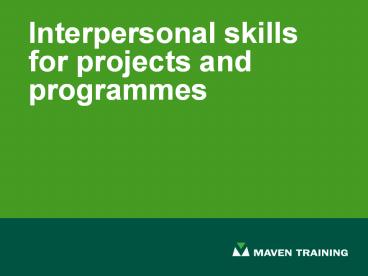Interpersonal skills for projects and programmes - PowerPoint PPT Presentation
1 / 17
Title:
Interpersonal skills for projects and programmes
Description:
Interpersonal skills for projects and programmes – PowerPoint PPT presentation
Number of Views:45
Avg rating:3.0/5.0
Title: Interpersonal skills for projects and programmes
1
Interpersonal skills for projects and programmes
2
Context setting
- Methodology is not enough
- Need to know how to do the job
- Increase in importance of skills in
internationally recognised approaches to project
and programme management - PMI
- IPMA
- New skills series from TSO aimed at project and
programme managers - General dissatisfaction by employers with level
of interpersonal skills displayed by staff
3
Completing the picture
Technical Project Management skills
Knowledge and understanding of Best Practice
Interpersonal skills
Specialist knowledge
4
Soft skills or interpersonal skills?
- Interpersonal skills
- Considers and responds appropriately to the
needs, feelings, and capabilities of different
people in different situations is tactful,
compassionate and sensitive, and treats others
with respect. - Transportation
Security Administration
Considers
responds
people
situations
5
Importance of interpersonal skills
6
Skill groupings
Assertiveness/Empathy
7
Challenges of this subject
- Managers think it is touchy feely and do not
see it as their place to train their staff in how
to be a better person - Managers do not connect strong interpersonal
skills with the bottom line of successful project
delivery - The subject is so broad that it is difficult to
be specific about what is required and how to get
there - No obvious start or end point so it is difficult
to know where to begin and how to estimate the
amount of training and investment required - It is not policy to invest in temporary staff
8
Skills derived from
Spiritual Intelligence
Emotional Intelligence
Cognitive Intelligence
9
Cognitive intelligence
- Intelligence quotient measures the ability to
solve logical or strategic problems - Analytic intelligence needs to be enhanced by
- Practical intelligence which is the capability to
solve problems - Creative intelligence which is the capability to
find new approaches
10
Emotional intelligence
- Emotional quotient the ability to access ones
own and others personal feelings as crucial. It
is formed of - Self awareness
- Emotional resilience
- Motivation
- Interpersonal sensitivity
- Influence
- Intuitiveness
- Conscientiousness
- EQ has been identified as a requirement for the
effective use of IQ.
11
Spiritual intelligence
- Spiritual intelligence is described as "the
intelligence with which we address and solve
problems of meaning and value - The intelligence with which we can place our
actions and our lives in a wider, richer,
meaning-giving context, the intelligence with
which we can assess that one course of action or
one life-path is more meaningful than another." - (SQ), the ultimate intelligence that serves as a
necessary foundation for the effective
functioning of both IQ and EQ.
12
Developing emotional intelligence
Rational thought
Limbic system
13
Emotional competencies
- Self-awareness
- Emotional awareness, Accurate self-assessment,
Self-confidence - Self-management
- Self-control, Trustworthiness, Conscientiousness,
Adaptability, Achievement Orientation Initiative - Social awareness
- Empathy, Organisational awareness, Service
orientation - Social skills
- Developing others, inspiring and guiding,
Influence, Communication, initiating or managing
change - Negotiating and resolving disagreements,
Building bonds, Teamwork and collaboration
Source Goleman (1998)
14
Process Model
Closing a Programme
Getting Started
Making Progress
Closing Down
Closing a Project
15
Emotional rollercoaster
ve emotion
Providing a solution
Building the team
Coaching for performance
Problem solving making progress
New project
Handover implementation
Realisation of hard work
Negotiating deadlines
Conflict management
-ve emotion
16
Where next?
Maven Training Skills Academy
Managing yourself
Negotiation Skills
Facilitation Skills
Conflict Management Skills
Interpersonal Skills
17
Where next?
Maven Training Skills Academy
Managing others
Team Management Skills
Stakeholder Engagement Skills
Coaching Mentoring Skills
Leadership Skills































